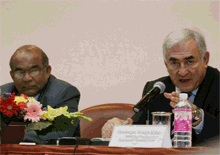
Typical street scene in Santa Ana, El Salvador. (Photo: iStock)
IMF Survey: IMF Head Urges Global Action to Counter Slowdown
February 13, 2008
- Financial crisis spreading to real economy
- Need macroeconomic and regulatory response
- Collaborative approach offers best hope of limiting slowdown
- Strauss-Kahn (r) with Reserve Bank of India Governor Y Venugopal Reddy during visit to central bank in Mumbai February 11 (photo: Reserve Bank of India)
IMF Managing Director Dominque Strauss-Kahn urged industrial and emerging market countries to do their share through macroeconomic and financial market policies to mitigate the impact of the current financial crisis which is causing a global slowdown.

Strauss-Kahn says IMF will focus on its comparative advantage in analyzing links between financial markets and the real economy (IMF file photo)
Subprime crisis
"The world economy has entered a difficult phase, with the financial crisis spreading to the real economy," Strauss-Kahn said in a speech to the Indian Council of Research on International Economic Relations (ICRIER) in New Delhi, India. "This has become a global problem that requires a global solution."
"Emerging markets need to join industrial countries in the macroeconomic and regulatory policy response. Such a collaborative approach offers the best hope for ensuring the stability of the global economy," he added in the February 13 address.
Weakening U.S. performance
Buffeted by recent financial market turbulence and a weakening U.S. performance, world growth is projected to slow to 4.1 percent in 2008, down from an estimated 4.9 percent last year, the IMF has said in its quarterly update for the global economy released in January.
Strauss-Kahn, who took over as head of the IMF last November, was on a visit to India and China after attending the Group of Seven (G-7 ) meeting in Tokyo over the weekend. "It has become increasingly clear that the macroeconomic effects of the financial market crisis will be serious and that no regions will escape entirely unscathed," he said
IMF comparative advantage
The IMF needed to focus on issues in which it had a comparative advantage.
"We need to pay more attention to the links between changes in the real economy and changes in financial markets—changes which go both ways. And we need to pay more attention to the links between national economic policies and international macroeconomic and financial developments—links which again go both ways," Strauss-Kahn stated. "The Fund has a clear comparative advantage in understanding these linkages and assessing their implications. With our involvement in the real economy and the financial sector, we stand at the corner of Main Street and Wall Street"

Strauss-Kahn (r) with Reserve Bank of India Governor Y Venugopal Reddy during visit to central bank in Mumbai February 11 (photo: Reserve Bank of India)
The current financial crisis, he said, began as "a problem in a single sector in a single economy—the housing market in the United States—has become a global problem." And what first appeared as a problem for financial institutions, is now becoming a problem for economies. He added that the effects, that are already seen in the United States, will increasingly be felt in Europe and that emerging economies will also not remain immune from the crisis.
Strauss-Kahn said that central banks in industrial countries were doing their part, while continuing to stabilize inflation expectations. "But governments may also need to deploy fiscal policy," he said. "Unless the situation improves, the fiscal authorities in countries with low fiscal risks should also prepare to exploit the headroom for timely and targeted fiscal stimulus that can add to aggregate demand in a way that supports private consumption."
Any fiscal stimulus, he added had to be temporary.
Need for more transparency
He said while central banks' actions are helping to restore confidence in financial markets, financial institutions also need to contribute through more transparency on and off their balance sheets, and assure investors of their financial soundness by raising capital and restoring liquidity. Auditors and supervisors need to encourage consistency across institutions on asset valuation and crisis-related writedowns, he added.
Strauss-Kahn said that sustained strong growth in the emerging economies has been based in part on stronger policy frameworks, but it has also been based on gains from trade and financial integration in the global economy "The industrial and emerging economies are like two horses yoked together," he said. "If one is tired, the other can take up more of the strain for a while. But if one stops in its tracks neither is going to get very far." He urged the emerging economies to prepare for a potential downturn by considering the scope for monetary easing and for fiscal stimulus. Regarding financial market policies, Strauss-Kahn said emerging markets can learn from the risk management and regulatory failures of industrial economies by building regulatory capacities to safeguard against the risks of non-transparent instruments and excesses in lending.
Strauss-Kahn said the IMF's current reform process will strengthen its comparative advantage of analyzing and assessing the links between real and financial sector developments and the interlinkages between national economies and the global economy. "There is a hunger around the world, and especially in emerging markets, for greater understanding and insight on these links," he said. "The Fund is the institution with the greatest capacity to provide such insight."


